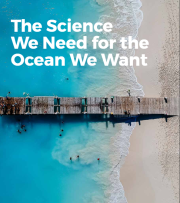250 marine scientists from 32 countries attended the Second International Symposium on the Ocean in a High-CO2 World at the Musée Océanographique, Monaco from 6-9 October 2008. The purpose of the meeting was to provide an interdisciplinary forum to assess what is known about ocean acidification and to identify priorities for future research.
Scientists concluded that the acidification of the world’s oceans, caused by the absorption of huge volumes of carbon dioxide, is accelerating at an unprecedented rate, threatening marine ecosystems and the livelihoods of tens of millions of people.
Dr. James Orr of the IAEA and Chairman of the meeting said that ocean chemistry is changing. The acidity of ocean surface waters has increased by 30 percent since the industrial revolution. It is greater and happening about 100 times faster than for previous acidification events experienced in many millions of years.
He continued that “Published research indicates that by 2030, the Southern Ocean will start to become corrosive to the shells of some marine snails that swim in surface waters. These snails provide a major source of food for Pacific Salmon. If they decline or disappear in some regions, such as the North Pacific, what will happen to the salmon – and the salmon fishing industry? And what will happen as ocean acidification increasingly affects coral reefs, which are home to one-quarter of the world’s fish during at least part of their lifetime, and which support a multi-billion dollar tourist industry?”.
The scientists attending the Monaco conference agreed that much more research is needed to understand the implications and impact of the acidification occurring today. They also insisted that reducing carbon emissions would be the only effective way of stabilizing or reversing the acidification process, and argued that, despite the reticence of many governments, this was both achievable and affordable.




